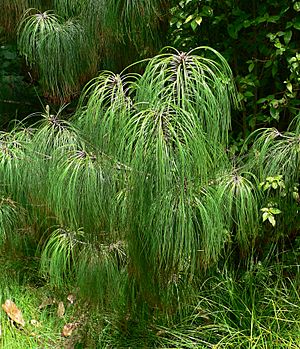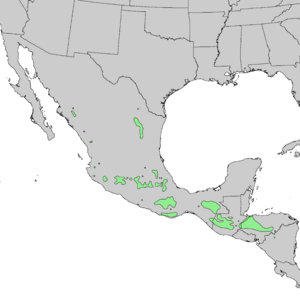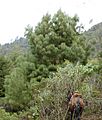Pinus pseudostrobus facts for kids
Quick facts for kids Pinus pseudostrobus |
|
|---|---|
 |
|
| var. apulcensis in cultivation | |
| Conservation status | |
| Scientific classification |
|
| Kingdom: | Plantae |
| Clade: | Tracheophytes |
| Division: | Pinophyta |
| Class: | Pinopsida |
| Order: | Pinales |
| Family: | Pinaceae |
| Genus: | Pinus |
| Subgenus: | Pinus subg. Pinus |
| Section: | P. sect. Trifoliae |
| Subsection: | P. subsect. Ponderosae |
| Species: |
P. pseudostrobus
|
| Binomial name | |
| Pinus pseudostrobus |
|
 |
|
| Natural range of Pinus pseudostrobus. Pinus pseudostrobus is also found in El Salvador. | |
| Script error: The function "autoWithCaption" does not exist. | |
| Synonyms | |
|
Pinus angulata Roezl Pinus alpucensis Lindl. Pinus astecaensis Roezl ex Gordon Pinus coatepecensis (Martínez)Gaussen Pinus estevezii (Martínez) J.P.Perry Pinus heteromorpha Roezl Pinus nubicola J.P.Perry Pinus oaxana Mirov Pinus orizabae Gordon Pinus prasina Roezl Pinus protuberans Roezl Pinus regeliana Roezl Pinus yecorensis Debreczy & I.Ràcz |
|
Script error: No such module "Check for conflicting parameters".
The Pinus pseudostrobus, also known as the smooth-bark Mexican pine, is a type of pine tree. In Spanish, people call it chamite or pacingo. This tree grows in the forests of Mexico and Central America.
It can grow quite tall, usually between 8 and 25 meters (about 26 to 82 feet). Its top part is dense and round, like a big green ball. When the tree is young, its bark is smooth and brown. As it gets older, the bark becomes more cracked.
Contents
Where the Smooth-Bark Mexican Pine Lives
This pine tree grows in many places. You can find it from Sinaloa, Mexico, all the way to Nicaragua and Honduras. It likes to grow at high places, from 850 to 3250 meters (about 2,790 to 10,660 feet) above sea level.
It grows in areas where most of the rain falls during the summer. This helps the tree get enough water to thrive. There is even a small group of these pines in Imperial County, California, in a park near the Colorado River.
Protecting This Pine Tree
The smooth-bark Mexican pine is important. Sometimes, too many of these trees are cut down for wood. Because of this, efforts are made to protect them. This includes ex-situ conservation, which means protecting the trees outside of their natural habitat, like in special gardens or seed banks.
Different Types of Smooth-Bark Mexican Pine
An English plant expert named John Lindley first described this tree in 1839. There are a few different kinds, or varieties, of the smooth-bark Mexican pine. These include:
- Pinus pseudostrobus var. apulcensis (called Apulco pine)
- Pinus pseudostrobus f. protuberans
- Pinus pseudostrobus var. pseudostrobus
This tree has also been planted in other countries, like New Zealand. It has grown well there, even near the ocean.
Images for kids
-
Male cones at San Francisco Botanical Garden
See also
 In Spanish: Pino lacio para niños
In Spanish: Pino lacio para niños
 | Audre Lorde |
 | John Berry Meachum |
 | Ferdinand Lee Barnett |




